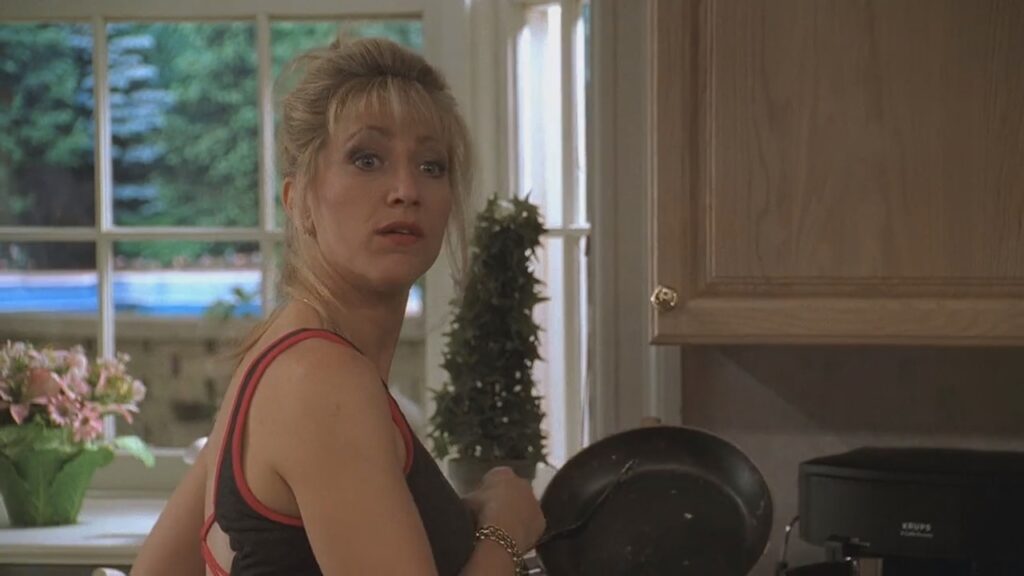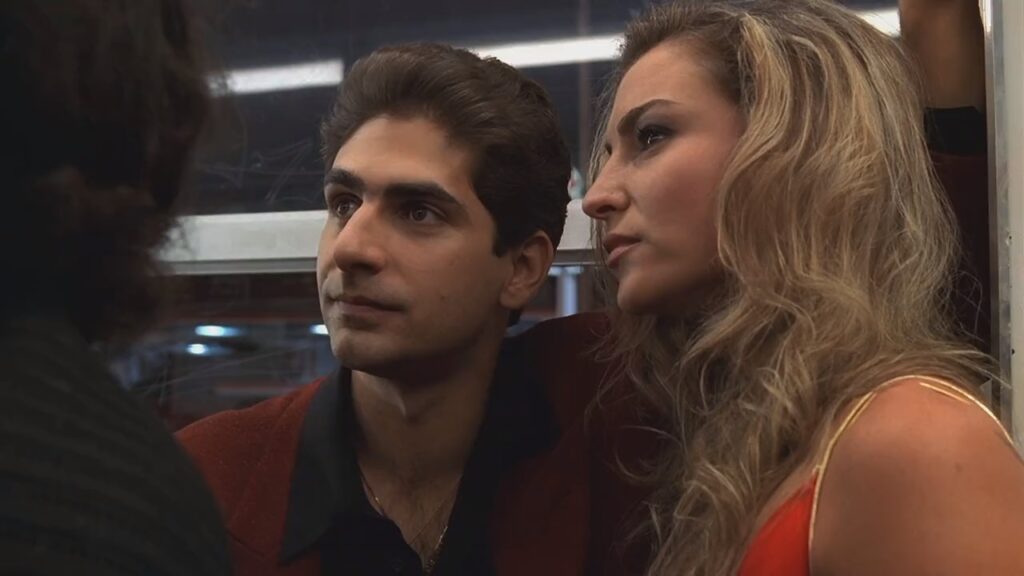“The Sopranos” Episode 5 – “College” – TV Review

A Groundbreaking Episode in Television History: The Sopranos’ “College”
“The Sopranos” has long been lauded as one of the greatest television series of all time, and Season 1, Episode 5, titled “College,” is frequently cited as a standout episode that not only exemplifies the show’s brilliance but also changed the landscape of TV forever. Airing on February 7, 1999, this episode marked a pivotal moment in the series and in the broader context of television storytelling.
Synopsis and Context
In “College,” Tony Soprano, played by James Gandolfini, takes his daughter Meadow, played by Jamie-Lynn Sigler, on a road trip to Maine to visit prospective colleges. This father-daughter trip is meant to be a bonding experience, but it quickly becomes complicated when Tony spots a former mobster, Fabian “Febby” Petrulio, who had turned state’s evidence and entered the witness protection program. Meanwhile, back in New Jersey, Carmela Soprano, played by Edie Falco, is home sick with the flu and receives a visit from Father Phil Intintola, which leads to its own set of tensions and revelations.
Character Development and Dynamics
One of the most significant aspects of “College” is the deep character development and exploration of the Soprano family dynamics. Tony and Meadow’s relationship is at the forefront, showcasing a rare moment of honesty between the two. Meadow, on the cusp of adulthood, questions her father’s profession, leading to a moment of partial truth from Tony. He admits to being in waste management but also hints at the darker aspects of his life. This conversation underscores the complexities of their relationship and the dichotomy of Tony’s life as both a family man and a mob boss.
Tony’s encounter with Febby Petrulio introduces a moral quandary that is central to the episode. The decision to pursue and ultimately kill Febby, despite being on a trip with his daughter, highlights Tony’s ruthlessness and commitment to the mob’s code of silence. This duality – the loving father and the cold-blooded killer – is portrayed with nuance and depth, making Tony one of the most compelling characters in television history.
Carmela and Father Phil: A Subplot of Emotional Complexity
While Tony and Meadow’s journey takes center stage, the subplot involving Carmela and Father Phil is equally rich in emotional complexity. Carmela, isolated and vulnerable due to her illness, seeks comfort in Father Phil’s company. Their interactions bring to light Carmela’s inner conflicts about her marriage and her husband’s criminal activities. The tension between spiritual faith and earthly desires is palpable, culminating in an almost intimate moment that is interrupted, leaving Carmela with a sense of unfulfilled emotional need.
The revelation that Dr. Melfi, Tony’s therapist, is a woman adds another layer to Carmela’s unease. This discovery triggers feelings of jealousy and insecurity, further complicating her perception of her marriage. Edie Falco’s performance in these scenes is nothing short of masterful, conveying a wide range of emotions with subtlety and power.
The Impact of “College” on Television Storytelling
“College” is often cited as one of the greatest episodes in television history for several reasons. Firstly, it broke new ground in terms of narrative structure and character development. The episode’s willingness to show the protagonist committing a murder in cold blood, while simultaneously exploring his role as a father, was unprecedented. This blend of domestic and criminal life set a new standard for complexity in TV characters.
The episode also pushed the boundaries of what was acceptable on television. By depicting a brutal act of violence carried out by the show’s main character, “College” challenged viewers to grapple with the moral ambiguities of Tony’s actions. This approach paved the way for future shows that would feature morally complex characters, such as “Breaking Bad,” “Mad Men,” and “The Wire.”
Moreover, “College” demonstrated the potential for television to be a medium for sophisticated storytelling, on par with cinema. The episode’s tight script, nuanced performances, and thematic depth showcased the artistic possibilities of TV, contributing to the rise of the “Golden Age of Television.”
Critical Reception and Legacy
Upon its release, “College” received widespread acclaim from critics and audiences alike. It was praised for its bold storytelling, character depth, and the performances of James Gandolfini and Edie Falco. The episode is frequently included in lists of the greatest television episodes of all time and is often highlighted as a key example of the show’s brilliance.
The legacy of “College” extends beyond its critical acclaim. It has had a lasting impact on the television industry, influencing countless shows and creators. The episode’s success demonstrated that audiences were ready for complex, morally ambiguous characters and sophisticated narratives, leading to a wave of critically acclaimed dramas that followed in its footsteps.
Thematic Exploration
At its core, “College” is an exploration of identity, morality, and the human condition. Tony’s dual identity as a family man and a mobster is a central theme, highlighting the inherent contradictions and conflicts within his character. The episode delves into the concept of moral relativism, challenging viewers to consider the complexities of right and wrong in Tony’s world.
The theme of identity is also explored through Meadow’s character. As she visits colleges and contemplates her future, Meadow is in the process of forming her own identity, separate from her family. Her conversations with Tony provide insight into her growing awareness of her father’s true nature and the moral complexities of his life.
Carmela’s storyline adds another layer to the theme of identity, focusing on her role as a wife and mother within the confines of a morally questionable marriage. Her interactions with Father Phil and the revelation about Dr. Melfi force her to confront her own values and beliefs, leading to moments of introspection and doubt.
Cinematic Qualities
“College” is notable for its cinematic qualities, which elevate it above the standard television fare of its time. The episode’s direction, by frequent series director Allen Coulter, is sharp and focused, with a keen eye for visual storytelling. The use of the picturesque Maine setting provides a stark contrast to the dark events that unfold, enhancing the episode’s thematic depth.
The cinematography, by Alik Sakharov, is equally impressive. The episode’s visual style is marked by its use of natural light and realistic settings, creating an immersive and authentic atmosphere. The contrast between the serene college campuses and the violent underworld of the mob is stark, underscoring the duality of Tony’s life.
The episode’s score, composed by series regular David Chase, complements the visual storytelling with a blend of haunting melodies and atmospheric soundscapes. The music enhances the emotional resonance of the scenes, from the tense moments of Tony’s pursuit of Febby to the intimate, introspective moments between Carmela and Father Phil.
Performances
The performances in “College” are universally exceptional, with James Gandolfini and Edie Falco delivering standout performances. Gandolfini’s portrayal of Tony Soprano is a masterclass in acting, capturing the character’s complexity and depth with subtlety and nuance. His ability to convey both the loving father and the ruthless mobster in a single episode is a testament to his skill as an actor.
Edie Falco’s performance as Carmela is equally compelling. Her portrayal of a woman grappling with her own moral dilemmas and emotional needs is both powerful and poignant. The chemistry between Falco and Michael Santoro, who plays Father Phil, adds an additional layer of depth to the episode, making their scenes together some of the most memorable.
Jamie-Lynn Sigler also shines as Meadow, bringing a sense of authenticity and vulnerability to her role. Her interactions with Gandolfini are genuine and heartfelt, capturing the evolving dynamic between father and daughter. Sigler’s performance adds a crucial layer to the episode’s exploration of identity and moral complexity.
A Turning Point in Television
“College” represents a turning point in television, marking a shift towards more sophisticated and complex storytelling. Its impact can be seen in the numerous shows that followed, which embraced the same willingness to explore moral ambiguity and character depth. The episode’s success demonstrated that audiences were ready for a new kind of television, one that challenged traditional narratives and pushed the boundaries of the medium.
The influence of “College” extends beyond its immediate impact on “The Sopranos.” It helped to pave the way for the rise of serialized dramas that would come to define the “Golden Age of Television.” Shows like “The Wire,” “Breaking Bad,” and “Mad Men” owe a debt to “The Sopranos” and episodes like “College,” which showed that television could be a medium for serious, character-driven storytelling.
Conclusion
“College” is more than just a standout episode of “The Sopranos”; it is a landmark moment in television history. Its exploration of complex themes, masterful character development, and cinematic qualities set a new standard for what television could achieve. The episode’s impact on the television industry is undeniable, influencing countless shows and creators in the years that followed.
The episode remains a testament to the power of television as a medium for storytelling, capable of exploring the depths of the human condition with nuance and sophistication. “College” is a shining example of what makes “The Sopranos” one of the greatest television series of all time, and its legacy continues to be felt in the world of television today.




